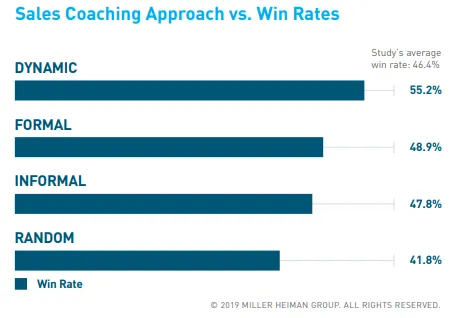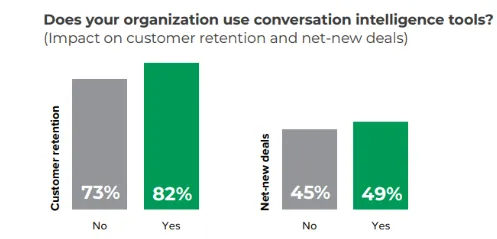There’s no denying the impact sales coaching can have on businesses. Companies that provide optimal sales coaching realize 16.7% higher annual revenue growth rates than those that don’t. Note the usage of the word optimal. For it to deliver impressive and consistent results, sales coaching needs to be effective.
But what does effective sales coaching look like?
An effective sales coaching program drives performance and process improvements – while being formal, data-driven, and individualized. It relies on the whole team – not just managers – to enable self and peer coaching while identifying strengths and weaknesses, establishing best practices, and tracking performance.
Sales coaching can help organizations increase sales productivity by 88%, but this level of effectiveness doesn’t happen by chance. Read on to know what you need to do to ensure your sales coaching is effective.
6 factors that make sales coaching effective
1. It is consistent and structured
CSO Insights’ 2019 Sales Enablement study clearly shows that the more formal sales coaching, the higher its impact on performance.

For sales coaching to be effective, you need to formalize the process. This formalization means that you need to
- Set a cadence for sales coaching sessions
- Create a framework that sales managers and individuals can use
- Include a quantitative component that leverages data to identify and track focus areas.
2. It is individualized and iterative
An effective sales coaching program takes the whole team along while catering to every individual along the way.
Effective sales coaching relies on identifying a sales rep’s strengths and areas of improvement in their context.
61.4% of companies with effective sales coaching programs spend more than an hour per rep on coaching each week,
3. It identifies and shares best practices
As much as sales coaching is about identifying individual strengths and weaknesses, it is also about identifying best practices and propagating them through the sales team.
When sales coaching provides reps with coaching insights that are established to have worked in their context, you make it easier to have a consistent sales motion.
A simple example of this in action is using templated talk tracks and scorecards for standard customer-facing conversations like discovery calls, objection handling, demo calls, etc.
4. It includes a mix of skill, deal, and strategic coaching
Effective coaching focuses on tactical skills and big-picture aspects – meaning that it needs to focus on
- Skill coaching: Focused on developing sales reps’ skills and behaviors and is aimed at developing their knowledge, mindsets, and behaviors and covers aspects like active listening, confident communication, consultative/questioning, etc.
- Deal coaching: Focused on deal or account-specific strategy and execution. Deal coaching is harder and more effort-intensive, but it promises higher returns.
- Strategic/long-term coaching: Focuses on relationship building, customer champion nurturing, advocacy, etc.
5. It leverages data and technology
Customer meeting data, actual performance data, and coaching data – all need to come together to anchor and guide sales coaching. This is where sales coaching tools can help. They can compile and analyze data to help form conclusions and communicate findings. These data-backed insights can be used to decide the course of action and further coaching.
Organizations that use sales coaching tools report an 8% increase in win rates.
Conversation intelligence tools have emerged as a way to support sales coaching initiatives. By incorporating call recording and AI-powered conversation analysis, they can help identify winning behaviors and areas of improvement and concrete next steps, while providing an easy way to capture coachable moments.
As per the 2021 Sales Enablement Analytics Report, conversation intelligence tools have helped companies improve both customer retention and new deals.

Conversation intelligence tools like Gong and Chorus have helped thousands of enterprise companies with their sales coaching needs.
If you’re a startup or early-stage company looking to explore conversation intelligence for sales coaching, you might find MeetRecord helpful.
6. It measures improvement and impact on outcomes
According to CSO Insights’ 2021 Sales Enablement Analytics Report, companies that measure competency improvement as a coaching metric see a 7% improvement in quota attainment. But that’s not the only way to measure the effectiveness of coaching.
To truly make coaching effective, you’ll need to track both effort and outcomes. For instance, you could track
- Process adherence
- Soft skills or conversational skills
- Number of reps incorporating best practices
- Skills improvement
…in addition to outcomes such as
- Sales cycle length
- Quality and quantity of leads
- Conversion rate
- Sale price, etc.
3 often-ignored aspects that make sales coaching more effective
While the six factors outlined above are key to effective coaching, there are three steps you can take to push your coaching game to the next level.
Make coaching 2-way
Provide sales reps avenues to
- Offer feedback (surveys, Office Hour sessions, interviews, etc)
- Request support. (where sales reps can request specific support)
This is key for sales reps to develop a healthy sense of ownership over their performance and professional development.
Leverage peer coaching
Nearly 33% of companies lack systems and processes to share learning among employees, according to a McKinsey survey. But given that employees prefer learning from their colleagues over channels such as YouTube, training courses, and Google, it’s a huge mistake to not leverage peer learning within your sales coaching program.
Use gamification and incentives
Sales is hard. Getting better at it is just as hard.
Incorporate elements of gamification and incentivization to bring in a motivation-building aspect to sales coaching. Whether it is a leaderboard to recognize and applaud achievements, weekly challenges to drive engagement, or monetary incentives, there’s a lot you can do to make sales coaching effective and engaging.
How do you know if your sales coaching is effective?
Remember: Investing in sales coaching is playing the long game. Results will take time, and you need to be patient.
But if you remain committed to it, here are a few signs that your sales coaching approach is effective:
- Your sales reps take more ownership of learning and performance
- You see a positive impact on employee motivation and hence, sales rep retention
- You see shorter sales cycles
- Deals have higher win rates


.svg)

.webp)








